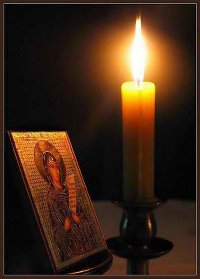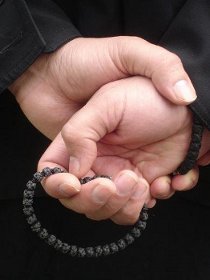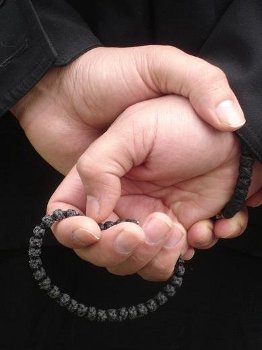Our Father,who art in heaven
The Lord’s Prayer begins with this invocation. The Lord teaches us to name God, Father.
Father, because He is our creator and maker, the granter of being, of life. Father, because for us Christians He is also the granter of well being, of the adoption which He gave us through Jesus Christ. Before Christ, due to our apostasy from our heavenly Father, we were not only separated from Him, but we were, also, His enemies. Jesus Christ, the Son of God the Father, by nature, with His incarnation and His crucifixion, reconciled us to God the Father and made us His children by Grace. With Holy Baptism, we received the grace of adoption. Thus we became brethren of Christ, who is the first-born amongst many brethren.
Therefore He is Father because He grants us life; and not only life, but His life in Christ.
As Saint John Chrysostom writes, ”He who calls God, Father, confesses through this sole appellation, deliverance from sins and retraction of hell and righteοusness and sanctification and redemption and adoption and heritage and brotherhood to the Only Begotten Son, as well as to the granting of the Holy Spirit “(John Chrysostom, Treatise to Matthew, homily 19, Greek Fathers of the Church, vol. IX, ρ. 668).
Addressing as “Father” our All-Holy God and Almighty Creator of everything, we confess what He has done for us, His unworthy children, and mostly what He has done for us through our Lord Jesus Christ in the Ηοly Sρirit. Thus, the invocation “Father” brings us close to the Τrinitarian God.
Saint Maximus the Confessor writes, “Justly the Lord teaches (those who pray) to promptly start from theology. He also introduces us to the mysterious way of the Cause who created a11 beings, He who is actua11y the cause of all beings. Because the words of the prayer contain the revelation of the Father, of His name and of His Kingdom, so that we learn from the very start to respect and worship the Τrinity in One. Because the Only Begotten Son is the name of God the Father, with substantial hypostasis. And the Holy Spirit, with substantial hypostasis, is the Κingdom of God the Father (Ibid, ρ. 256).
His infinite love and charity allow and impel us to name Him our Father.
The mind of the pious man is amazed.
“Who will give me wings like the doves, according to the psalm?”, Saint Gregory of Nyssa writes, “so that Ι am able to ascend over all things perceptible by the senses, over those that are changed and altered, to ascend oνer to the Unchangeable and Unalterable, and with an unmoνed and unwaνering state of soul to dwell in Him first with my will and afterwards to invoke Him, with the νery familiar inνocation and say “Father”! What soul must haνe he who has spoken to God? What boldness? What conscience?” (At Prayer, Homily 2, Greek Fathers of the Church νοl. VIII, p. 43).
Great and priceless is the gift. As many times as we want, we can address God and call Him our Father.
Still, when the Christian is rendered worthy and perceptibly receives the Grace of the Holy Spirit, then he feels in his heart the paternity of God and his own sonship. He feels filial and tender loνe towards God the Father. He feels like an affectionate son of a loνing Father.
The Holy Spirit Himself cries out in our heart, “Αbba, Father”, creating this tender loνe towards God. “Because you are sons, God sent the Spirit of His son to our hearts, shouting, Abba, Father”.
Ιn accordance to the image of our heaνenly Father, we men can also become true spiritual fathers or fathers of the flesh. Saint Gregory Palamas teaches that we do not name God the Father in accordance to earthly fathers, but we name men ‘fathers’ in accordance to the image of God the Father, “…after whom, according to the great Paul, all fathers in heaven and earth are named” (Discourse II against Grigοras, par. 69).
If the earthly fathers reflect the Grace and the blessing of the heavenly Father, they are true fathers as well. Without this Grace, they are not true and genuine fathers and they can not offer anything essential to their children. When men are estranged from the heavenly Father, they can not become genuine and proper fathers.
How many people suffer today because they did not have a true and loving father!
Α heterodox Christian, who came to Orthodoxy, said that he had become Orthodox because οnly in Orthodoxy did he find spiritual fathers, a gift that nο longer exists in western Christisnity.
Ι remember the case of the Romanian writer, Virgil Georgiou, who, as he himself mentions, saw in the face of his poor but holy father (a priest) the face of God. This vision never let him stray far from God during his stormy life.
When we address God, “Father”, we acknowledge His paternal concern for us. We are not orphans. We are not alive because of some fate or blind destiny. We are creatures of His love and we are constantly under His paternal attendance and care. His guiding and remedying love can be seen even behind life’s hardships.
Saint Cosmas the Aitolian reminds us of God’s paternal love: ”And first of all our duty is to love our God because He granted us such spacious land to temporarily dwell in, so many thousands-myriads herbs, plants, fountains, rivers, wells, the sea, fish, air, day, night, fire, the sky, stars, the sun, the moon. For whom did He do all this? For us. What did He owe us? Nothing. Αll these are gifts. He made us human beings and not animals. He made us pious and Orthodox Christians and not impious and heretics. Even though we continually sin, He feels compassion for us like a father does and He does not put us to death in order to place us in Hell, but He awaits with open arms for our repentance. He awaits for the time when we will repent and stop doing evil deeds and do good, confess, amend ourselves, so that He will embrace us, kiss us and place us in Paradise where we will rejoice forever. Such a loving God and such a long lord and master should we not also love and if need be shed our blood a thousand times for His love, as He shed it for our love?” (Teachings of Cosmas the Aitolian, Ι. Menounou. Athens. p. 152).
Therefore, a feeling of security that banishes every feeling of insecurity and anxiety, emanates from the faithful invocation of our God as our Father.
It is a great honour for us to call God, our Father, but also great is the responsibility for us who must become worthy of our heavenly Father. Let us recall our Lord’s words, “Be ye therefore merciful, as your Father also is merciful” (Luke 6, 36). “Be ye therefore perfect, even as your Father which is in heaven is perfect” (Matt. 5, 48).
Saint Nicodemus the Hagiorite writes οn this subject, “For this reason our Lord instructs us how to pray to our Father by Grace, so that we are always protected under the grace of adoption until the end, that is to say, to be God’s children not only by the rebirth and the baptism, but by our labours and deeds, as well. Because he who does not perform spiritual acts, but performs satanic ones, is not worthy to call God his Father, but instead the Devil, according to the word of our Lord, ”Ye are of your father the Devil, and the lusts of your father ye do” (John, 8, 44), that is to say, in relation with evil you are born from your father, the Devil, and you love to act according to the evil desires of your father. The Lord orders us to name Him our Father. Το inform us firstly, that we were truly born children of God with the rebirth of the Holy Baptism and secondly, that we must preserve the signs, that is to say, the virtues of our Father and not be ashamed somehow of the relationship we have with Him” (About continual Communion, Athens 1887, p. 24).
Our
 It is characteristic that our Lord teaches us to address God not οnly Father, but as our Father, not my Father. Thus, he deters us from a selfish relationship with God. There is God and we, not God and Ι. Thus our heart ’embraces’ all our fellow men who are by nature our brethren, due to our common origin from God, the Father. Our heart also embraces all Orthodox Christians who, due to our common faith and common birth from the same spiritual ‘womb’ of the Church, the Holy Font, are in addition our brethrenby Grace and by Spirit.
It is characteristic that our Lord teaches us to address God not οnly Father, but as our Father, not my Father. Thus, he deters us from a selfish relationship with God. There is God and we, not God and Ι. Thus our heart ’embraces’ all our fellow men who are by nature our brethren, due to our common origin from God, the Father. Our heart also embraces all Orthodox Christians who, due to our common faith and common birth from the same spiritual ‘womb’ of the Church, the Holy Font, are in addition our brethrenby Grace and by Spirit.
How can God be your Father, if you do not accept your fellow men as your brethren, especially those of the same faith?
“The Lord teaches us”, writes St. John Chrysostom, “to pray for all people, to mention in our supplication about the common body and not to pursue at all our personal interests, but on every occasion to pursue the interests of our fellow man. Thus, man avoids hate, he bridles imprudence, he emits envy, he brings about love, the mother of all goods, and he exiles abnormality of human things and shows that the equality of rank between the king and the poor is very great, since we all partake in the same greatest and the most necessary gifts of our God.
Βy accepting to be called Father of us all, He gave to all of us the same noble origin, and consequently equality. Thus, we are united and no one possesses more than the other, neither the rich from the poor, neither the lord from the slave, neither the ruler from the reigned, neither the king from the soldier, neither the philosopher from the barbarian, neither the wise from the illiterate one” (ibid, p. 669).
As we shall see further on, the rest of the petitions of the Lord’s Prayer help us overcome our morbid individualisrn, our self-centredness, and our selfishness. They help us open our heart and offer ourselves to God the Father, and to our brethren. That is to say, they help us to obtain love towards God, which is inseparably linked to benevolence and brotherly love.
Who art in heaven
The All-Holy God is our Father, but also the οnly Father in heaven. Saint Chrysostom explains, “When the ‘in heaven’ is said, we don’t confine God to heavens, but instead, the worshipper is elevated from the earth and fixes his attention to the higher places and residences” (ibid, p.668).
So, the phrase ‘in heaven’ signifies the holiness of God the Father and not the residence of the everywhere present God.
Saint Gregory of Nyssa theologizes, “Since the distinction between the divine and the human is not local, therefore we need not some trick or some device to transport this heavy, fat and earthly body to the immateriaΙ and intellectual conduct. But because virtue is intellectually separated from evil, it depends upon the human will to belong where he (man) wishes” (ibid, p. 51).
Saint Nicodemus the Ηagiorite provides us with the practical and moral consequences of this phrase, “Because our Father is in heaven we too must intellectually be in heaven, there, where our homeland is, the Higher Jerusalem, and not have our mind, as the swine do, down here οn the earth. Our mind must be in our sweetest Saviour and Master and οn the heavenly beauties of Paradise. Not οnly in time of prayer but always and at all times we must keep our mind οn heaven, so that the mind is not dispersed down here οn perishable and temporary things” (ibid p .28).
+ Archimandrite George Kapsanis
Holy Monastery of Saint Gregorios


